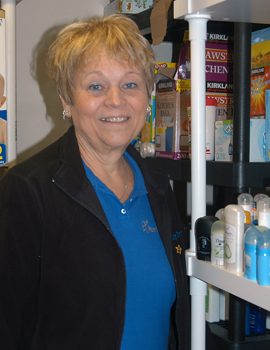Interfaith Hospitality Network changes name to Family Promise
Interfaith Hospitality Network in Spokane recently changed its name to Family Promise to reflect the national program’s name, which changed in 2003, and because the local program now includes more than giving short-term shelter for homeless families.
 |
| Madelyln Bafus, Family Promise Spokane |
Of the 16 families served in 2011, 11 have found housing, three are in transitional housing and two are still housed in churches.
Nationally, Family Promise has 172 affiliates and includes several programs: Interfaith Hospitality Network, housing families in churches; Family Mentoring; the Just Neighbors Program, which helps people in congregations understand why people are homeless, and Community Initiatives, which mobilize clergy and volunteers to advocate for public policies to improve economic stability for low-income families.
Spokane’s Interfaith Hospitality Network, which started in 1996 as the 49th affiliate, changed its name to reflect that it provides other parts of the program. There are also Family Promise programs in North Idaho, Lewiston, Bozeman, Seattle and Portland.
“We are broadening what we are doing,” said Madelyn Bafus, executive director. “We grew but lost grants for transitional housing rent subsidies, so we scaled back to churches housing families.”
Facing cuts, she reduced her hours from 40 to 16 hours a week. Case manager Renee Norris went from 36 to 26 hours. Secretary Susan Heitstuman is at 40 hours.
“Unlike businesses that cut from the bottom up, we cut from the top,” Madelyn said. “While we have made cuts, we are maintaining our basic program of bringing homeless families into churches, which house them a week at a time.”
The goal of Family Promise is to help homeless and low-income families achieve sustainable independence by providing multi-faceted response to poverty.
The number of clients represents people helped once. After a family decides to leave, Family Promise of Spokane does not take them back, but will continue to help them. Other programs’ statistics include repeat clients.
“Our goal is to help people make good choices,” she said. “We have strict rules, because families are housed in churches and served by volunteers. Acceptance is based on readiness to make changes.”
Ten families typically apply each month, but 20 applied in November, because homelessness is growing.
Recognizing that it’s harder to help people today because it’s harder to find affordable housing, some families have stayed longer than the average of 60 days.
“We will not put people back into homelessness,” she said. “While most programs limited families to staying 90 days because of government grants, we have allowed some people to stay longer, because we want to be sure they will find housing.”
The number of people a church can house up to a maximum of 14—to fit in the 15-passenger van—determines how many families are served at a given time.
“It’s also hard to manage more, because we provide more than shelter. We work with the families daily to find housing, employment and the services they need,” she said. “Our case manager makes sure the children go to school, have clean clothes, and see dentists and doctors.”
Churches open their doors, move families in and provide a holistic experience. It’s more than housing. They have provided camperships and furniture. Members have helped parents find jobs and a few have donated cars.
Families are not like the Cleavers on TV, said Madelyn, because so much has happened to them.
“Church members can model good parenting, sitting at the dinner table together and passing food—meals the church and support churches have provided with meat and vegetables, not just pizza and hamburgers.”
Madelyn likes the words of the pastor at First Free Evangelical, the Rev. Lee Kisman, whose theory is that when families come, “We just love them.”
Five years ago, a family wanted to get married, so the church did their wedding complete with flowers, reception and clothes. They still attend the church.
“We make it clear that we are there to love the families, be servants and answer questions, not preach to them,” Madelyn said.
Some churches give families $10 to $25 gift cards for gas or food. A supply room in the office at 608 S. Richard Allen Ct., is full of hygiene items.
With recent funding cuts, Family Promise thought it would have to move, but the New Bryant South Corporation of Richard Allen Apartments adjusted the rent. Also, with a grant, they are buying a washer and dryer, so they will save the $1,800 they budget each year for quarters to give to families to do their laundry.
“God is in charge and takes care of us, especially in our most difficult times,” said Madelyn, first helped the program when Spokane Valley United Methodist was a support church.
She joined the board in 2002, became case manager in 2006 and director in 2008.
She values the interconnection of the host and support churches.
Because church members sit down to have meals with homeless family members, when someone talks of homelessness, a face comes to mind.
“That’s the way Jesus was—in one-to-one relationships,” she said.
Some former families are now helping current families.
Madelyn challenges the state’s cutting its budget on the backs of the poor and voiceless.
“We are a safety net,” she said. “We invest money now so children will not be homeless as adults. We hope to stop homelessness in the next generation.
“We are all children of God. The families have something to contribute, too,” she said.
For information, call 747-5487 or email maddyb47@msn.com.
Copyright ©January 2012 - The Fig Tree




